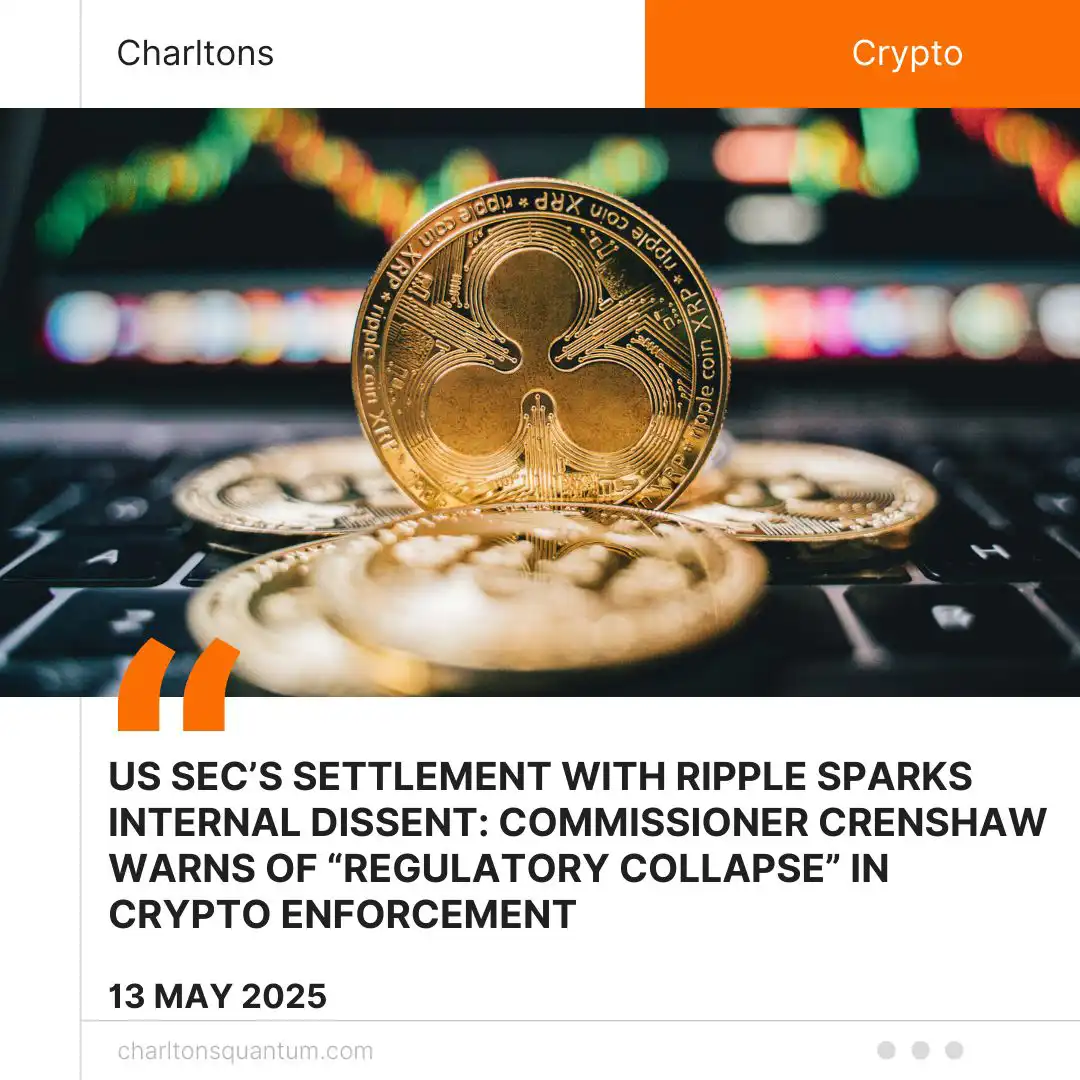
On 8 May 2025, United States Securities and Exchange Commission (US SEC) published a strongly worded statement of dissent by Commissioner Caroline A. Crenshaw criticised the US SEC’s recent settlement with Ripple Labs, Inc., warning that the agreement not only undermines judicial authority but also signals a strategic rollback of the agency’s crypto enforcement programme. The US SEC had previously secured a court ruling in 2024 that found Ripple’s institutional XRP sales violated Section 5 of the United States Securities Act of 1933, resulting in a civil penalty of over USD 125 million and a permanent injunction. However, under the new terms, Ripple will recover USD 75 million held in escrow and the injunction has been vacated, despite the absence of new statutory guidance or compliance undertakings.
Commissioner Crenshaw described the settlement as a “tremendous disservice to the investing public,” warning that the US SEC’s decision to stand down enforcement despite a favourable court ruling creates a dangerous precedent. “If Ripple decides tomorrow to sell unregistered XRP tokens to institutional investors, in plain defiance of the court’s order, this Commission will do absolutely nothing about it,” she remarked, stressing that the court’s decision is now effectively neutered, despite the agreement’s language purporting to preserve it.
Beyond its implications for Ripple, Crenshaw argued the settlement marks a programmatic dismantling of the US SEC’s crypto enforcement agenda, with a series of recent dismissals in other registration-related cases compounding the erosion. She cited the US SEC’s withdrawals in enforcement actions against Coinbase, Dragonchain, and Ian Balina, despite having established favourable caselaw. According to Crenshaw, the abandonment of these actions—under the pretext of an anticipated new regulatory path championed by the US SEC’s newly formed Crypto Task Force—amounts to an “enforcement vacuum” that leaves investors vulnerable.
Crenshaw discusses that the legal regime under which Ripple’s violations were judged remains unchanged, and any future framework, should it materialise, cannot retroactively absolve violations of existing securities laws. “We are accepting a diluted settlement, that erases the investor protections we already won, based on a non-existent framework that may or may not come to fruition years from now,” she warned, describing the situation as a regulatory vacuum with no end in sight.
The statement also raises serious procedural concerns about Commission’s reversal of enforcement priorities threatens the credibility of US SEC attorneys appearing in court today, who are now compelled to defend positions inconsistent with those taken mere months ago. This, she argued, violates the doctrine of regularity in government affairs, referencing the established presumption that governmental conduct is consistent and justified unless proven otherwise.
In terms of market impact, the dissent cast doubt on the interpretive clarity of the Ripple ruling itself, asking whether the settlement now signals tacit agreement with the partial invalidation of the US SEC’s position on XRP’s status as a security. “What is the legal effect of the ruling in place?” Crenshaw questioned, noting that investors are left without clear answers or assurances about disclosures to which they are legally entitled under current US securities law.
Crenshaw’s dissent reflects a deep internal division within the US SEC over the direction of crypto enforcement policy. While other US SEC Commissioners have showed a shift toward constructive regulatory engagement, Crenshaw warned that regulatory retreat in the face of pressure from digital asset companies threatens the US SEC’s core investor protection mandate. She concluded with an emphatic call for judicial scrutiny of the agency’s conduct, urging courts to examine the US SEC’s attempt to “gut its own enforcement programme from the inside out.”
(Source: https://www.sec.gov/newsroom/speeches-statements/crenshaw-statement-ripple-050825)





